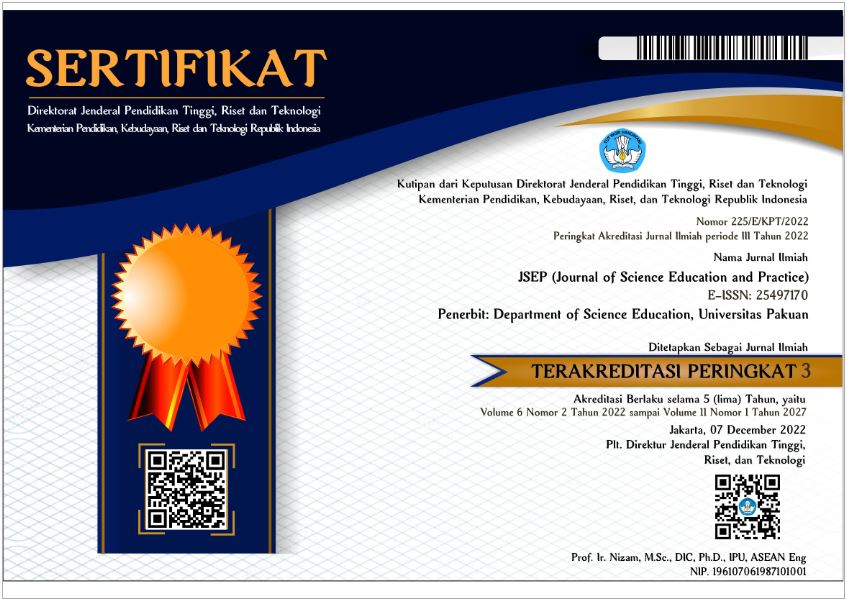ADDITIONAL MENU
Imtaq-Based Solar System Learning in Improving Mastery of Concepts and Religious Attitude Towards Madrasah Tsanawiyah Students
Abstract
Keywords
References
Ahmadi. 2010. Learning Process Creative and Innovative in class. Jakarta: PT. Performance References Creation
The Qur'an and its translation, 1997. Jakarta: PT. Earth Approval Binadja, A. 1999.
Arends, Richard. 2011. Learning to Teach. Yogyakarta: Libraries Student
Asep Nur Zaman. 2003. Islamic Education Out from Atmosphere old fashioned. Republika Newspaper. Monday January 6, 2003.
Azwar, Saipuddin. 2011. Attitudes and Behavior. Yogyakarta: Libraries Student
Dahar, Ratna Willis. 2011. Theories Study and Learning. Jakarta: Erlangga
Dimyati & Mudjiono. 2009. Learning and Learning. Jakarta: Rineka create,
Djamarah, Syaiful Bahri and Zain. 2006. Strategy Study teach. Jakarta: PT Rineka
Gito, Kasiful. 2014. Usage Method Hypnoteaching In Learning Biology based on Imtaq For Increase Mastery Draft Students on Concept System Reproduction in SMA Negeri 5 Cirebonâ€. Journal of Scientiae Educatia Volume 2 Issue 2
Khatimah, Nurhusnul. 2014. Influence Integration of Imtaq Values in Materials Atomic Structure Against Motivation and Character Religious ". Journal Assessment Science and Learning Mathematics and Science PRISMA SCIENCEâ€. Vol. 2. No.2 ISSN 2338-4530.
Komariah, Siti. 2015. Application Sets Approach (Science, Environment, Technology, Society) In Learning Biology based on Imtaq For Improving Learning Outcomes Students on Concept Pollution Environment in SMA Negeri 8 Cirebon City". Journal of Scientiae Education Volume 5 Number 1
Muhammad Alim. (2011). Islamic Religious Education. Bandung: PT Teenagers Rosdakarya.
Nurwulan, Wening. 2013. Difference Attitude Scientific and Mastery Draft Among Science Learning Using Inquiring Minds Want to Know Strategy and Strategy active Knowledge Sharing".
Sudijono, Anas. 2003. Introduction Educational Evaluation. Jakarta: King Grafindo.
Sudjana, Nana. 2009. Assessment of Learning Process Results teach. Bandung: PT Teenagers Rosdakarya.
Sugiyono. (2004). Method Study Business. Bandung: Alphabeta.
Slamet. 2010. Learning and Factors Affecting It. Jakarta: PT. Rineka Create
Supriyatman, 2014. "Improving Science Process Skills (SPS) Science Concepts Mastery (SCM) Prospective Student Teachers Through Inquiry Learning Instruction Model by Using Interactive Computer Simulation". International Journal of Science and Research (IJSR) Volume 3 Issue 2.
Syaifuddin Sabda, 2006. Curriculum Model Integrated Science and Technology and Imtaq, Design, Development and Implementation. Quantum Teaching. Jakarta
Usman, Moh. Uzer. 2005. Becoming a Professional Teacher. Bandung: Rosda Creation
Wahyana et al., 2007. Science education 4. Jakarta: 34-35 Open University.
Wiratmaja, CGA, Sadia, W, & Suastra, IW 2014. The Effect of Learning Model Against Sell-Efficacy and Emotional Intelligence High school students. Postgraduate Program E -journal Ganesha University of Education Science Study Program, (Online), Vol. 4, (http://www.pasca.undiksha , ac.id, accessed 11 February 2016.
DOI: 10.33751/jsep.v5i2.5703
 Abstract views : 244
Abstract views : 244
Refbacks
- There are currently no refbacks.
Copyright (c) 2021 JSEP (Journal of Science Education and Practice)

This work is licensed under a Creative Commons Attribution 4.0 International License.












